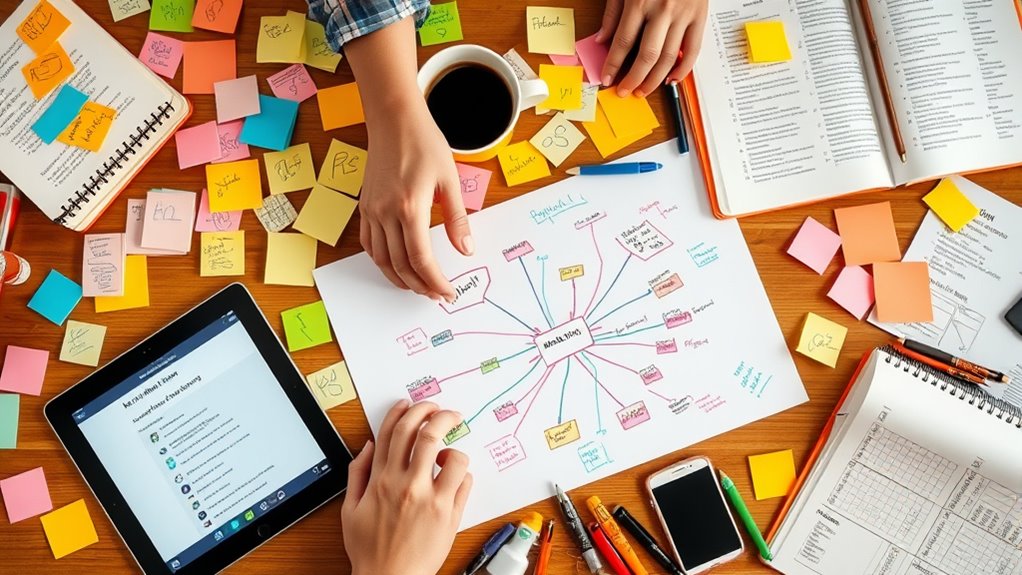To manage your mental load as a parent, consider using tools like digital apps, notebooks, or sticky notes to do daily brain dumps. Set aside a few minutes each day to jot down thoughts, tasks, and reminders—don’t worry about structure—then organize them into urgent and long-term categories. Regularly externalizing your thoughts helps reduce stress and increases focus. Keep exploring effective strategies to find what works best for you and your family.
Key Takeaways
- Digital apps like Todoist or Notion facilitate quick categorization and prioritization of mental load for busy parents.
- Note-taking tools such as Evernote or Google Keep help externalize thoughts and tasks efficiently.
- Paper notebooks or bullet journals offer a customizable, tactile method for daily mental dump routines.
- Sticky notes or whiteboards in common areas serve as visual reminders for ongoing mental tasks.
- Establishing a daily routine with set time for brain dumps enhances consistency and mental clarity.

Parenting often comes with a relentless stream of thoughts and tasks that can quickly become overwhelming. You might find yourself constantly juggling schedules, reminders, and responsibilities, all while trying to stay emotionally present for your children. That’s where mental load brain dump tools can make a real difference. These tools help you declutter your mind, giving you space to focus on what truly matters. By capturing your thoughts and to-dos on paper or digitally, you regain control over your time management and reduce feelings of being overwhelmed. When your mental load is organized, you’re better equipped to prioritize tasks, plan your day, and allocate your energy where it’s needed most. It’s about creating a clear mental space that allows you to be more intentional and less reactive.
One effective way to implement a brain dump is to set aside a few minutes each day to jot down everything on your mind. Don’t worry about structure or order—just get it all out. Writing things down not only clears mental clutter but also provides a visual overview of what needs your attention. This act of externalizing thoughts can be surprisingly calming, giving you emotional support by reducing anxiety and mental fatigue. Once your thoughts are on paper, you can start sorting them into categories—urgent tasks, long-term plans, or simple reminders. This process transforms an amorphous mental chaos into a manageable list, making it easier to create a realistic schedule. It’s a simple yet powerful way to practice better time management, ensuring you don’t forget important appointments or responsibilities. Incorporating organized methods can help streamline this process and make it even more effective.
You can adapt this tool to your preferences—use a notebook, a digital app, or sticky notes—whatever feels most accessible and convenient for you. The key is consistency; make it a daily habit so that your mental load doesn’t pile up. As you continue, you’ll notice a reduction in stress and a boost in your emotional resilience, because you’re actively managing your mental health alongside your household responsibilities. Over time, these brain dumps serve as a foundation for more effective planning and decision-making, freeing up mental energy for the more meaningful aspects of parenting. Remember, taking control of your mental load isn’t about perfection; it’s about creating a system that supports your well-being, keeps your mind clear, and allows you to show up fully for your family.
Frequently Asked Questions
How Often Should Parents Do a Mental Load Brain Dump?
You should do a mental load brain dump regularly, ideally once a week, to maintain mental clarity and emotional relief. This practice helps you unload your thoughts, worries, and to-dos, preventing overwhelm. By making it a routine, you’ll stay organized and reduce stress, allowing you to focus on what truly matters. Consistency is key—schedule a dedicated time to clear your mind and feel more in control.
Can Digital Tools Replace Traditional Pen-And-Paper Methods?
Digital tools like note-taking apps can effectively replace traditional pen-and-paper methods, especially for busy parents. For example, Sarah uses an app to organize her mental load, making it easy to quickly jot down tasks and reminders on her phone. Digital note-taking offers instant access and seamless app organization, allowing her to update and review her mental load anytime. This convenience helps her stay on top of everything without losing important details.
How Do I Prioritize Tasks After a Brain Dump?
After a brain dump, you should start with task categorization to organize your list into groups like urgent, important, and optional. Then, assess each task’s urgency to determine what needs immediate attention versus what can wait. Focus on high-urgency, high-priority tasks first, and delegate or postpone less critical ones. This process helps you create a clear action plan and reduces mental overload.
What Are Signs My Mental Load Is Becoming Overwhelming?
Imagine carrying a heavy backpack filled with unseen stones—that’s how your mental load feels when overwhelmed. You might notice emotional exhaustion creeping in and forgetfulness creeping up, making even simple tasks feel formidable. Your mind races with constant thoughts, and you struggle to focus or relax. These signs signal your mental load is too much; it’s time to pause, breathe, and prioritize self-care to lighten the weight.
Are There Specific Brain Dump Techniques for Working Parents?
Yes, as a working parent, you can use specific brain dump techniques like quick jotting or digital notes to organize your tasks. Focus on time management by listing urgent and non-urgent items, which helps reduce stress. Set aside a few minutes daily to clear your mind and prioritize tasks. These techniques streamline your day, giving you clarity and control, ultimately easing mental overload and improving your overall well-being.
Conclusion
Think of your mind as a bustling garden, full of blooming ideas and tangled weeds of tasks. Mental load brain dump tools act like a gardener’s trowel, helping you clear the overgrowth and plant new seeds of clarity. When you regularly tend to this garden, your mental space becomes a peaceful oasis. So, grab your trowel, dump the chaos, and nurture a calmer, more organized mental landscape—your mental garden will thank you.










